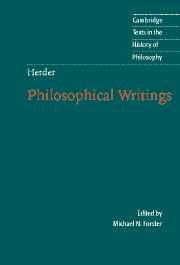Book contents
- Frontmatter
- Contents
- Introduction
- Chronology
- Further reading
- Note on the texts and translation
- Part I General Philosophical Program
- Part II Philosophy of Language
- Part III Philosophy of Mind
- On Thomas Abbt's Writings (1768) [selections concerning psychology]
- On Cognition and Sensation, the Two Main Forces of the Human Soul (1775) [preface]
- On the Cognition and Sensation of the Human Soul (1778)
- Part IV Philosophy of History
- Part V Political Philosophy
- Index
- Cambridge texts in the history of philosophy
On Cognition and Sensation, the Two Main Forces of the Human Soul (1775) [preface]
Published online by Cambridge University Press: 05 June 2012
- Frontmatter
- Contents
- Introduction
- Chronology
- Further reading
- Note on the texts and translation
- Part I General Philosophical Program
- Part II Philosophy of Language
- Part III Philosophy of Mind
- On Thomas Abbt's Writings (1768) [selections concerning psychology]
- On Cognition and Sensation, the Two Main Forces of the Human Soul (1775) [preface]
- On the Cognition and Sensation of the Human Soul (1778)
- Part IV Philosophy of History
- Part V Political Philosophy
- Index
- Cambridge texts in the history of philosophy
Summary
Est Deus in nobis, agitante calescimus illo.
– VirgilCognition and sensation are with us mixed creatures intertwined; we have cognition only through sensation, our sensation is always accompanied with a sort of cognition. Since philosophy abandoned the fragmenting, useless cleverness of the scholastics and attempted to find unity in all sciences, in the science of the soul too it has made great advances on this royal path. Since philosophy found common characteristic marks in thought and sensation; because the nature of the one could not be fully illuminated without the properties of the other; most of all, because [philosophy] the thinker was at heart a friend to and related to thinking, [philosophy] the seer to seeing, it inevitably proved comfortable for philosophy to posit a single force of the soul, thought, and to want to derive from it simply everything right down to the obscurest, most arbitrary sensation.
“No cognition,” philosophy says, “is without sensation, i.e. without some feeling of good or bad, of pleasure or pain, of being or nonbeing, in oneself or in the object. If the soul feels that it cognizes, then it enjoys itself, strives forth, develops its forces; the less impeded, the more lively. That is why a person is irritated by curiosity, i.e. the drive of wanting to know.
- Type
- Chapter
- Information
- Herder: Philosophical Writings , pp. 178 - 186Publisher: Cambridge University PressPrint publication year: 2002



